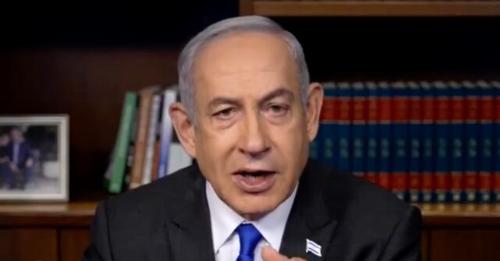
Israeli Prime Minister Benjamin Netanyahu issued a video statement on Sunday insisting that Israel will not agree to Hamas’s demand that it end the war as a condition of a deal to release the remaining Israeli hostages in Gaza.
“Israel has been, and still is, ready for a pause in the fighting in order to free our hostages,” he said. “[But] Israel will not agree to Hamas’s demands, which would mean surrender; it will continue fighting until all of its objectives are achieved.”
Netanyahu’s statement came amid protests in Israel both for and against such a deal, and after media speculation that the U.S. had guaranteed Hamas that it could prevent Israel from continuing to fight after hostages had been released.
Mediators from the U.S. — led by CIA director William Burns — as well as Egypt and Qatar are meeting with Hamas in Cairo, Egypt, in an attempt to secure a deal to release the remaining 130 or so hostages. At least 60 are believed to be alive, Israel’s Army Radio reported on Sunday.
According to reports, Israel has been prepared to make steep concessions, such as releasing potentially thousands of convicted Palestinian terrorists, some of whom are serving life sentences for their role in the murders of Israelis.
But Hamas has insisted that Israeli must agree to end the war permanently. The goal of the terrorist organization is to survive and to return to power in Gaza, rebuilding its forces and projecting an ability to harm Israel once again.
Both sides understand that if Hamas survives, it will have meant that Israel failed in one of the key objectives of the war. Israel would emerge weakened from any such deal, and Arab states might be less interested in alliance with it.
Israel has therefore hesitated before sending its own delegation to Cairo, saying that it will only do so if Hamas understands it cannot end the war through a hostage deal.
The last Hamas stronghold is in the town of Rafah, near the Egyptian border. The U.S. has urged Israel since February not to attack there, ostensibly for fear of harming civilians, but more likely to salvage the White House’s diplomatic goals.
The Biden administration has insisted that a Palestinian state emerge as an outcome of the war. Israelis used to back that goal, but now oppose it after the October 7 terror attack. Most support an invasion of Rafah to win the war.
However, with a potential hostage deal on the table, the Israeli public is divided. On the left, protesters demand a deal, with or without an attack on Rafah; on the right, protesters demand victory, with or without a hostage deal.
There is speculation that with such a deal, Netanyahu’s right-wing governing coalition partners will quit, and that without a hostage deal, Netanyahu’s left-wing partners in the emergency government of national unity will quit.
For days, the initiative has remained with Hamas, whose Gaza-based leader, Yahya Sinwar, has reportedly insisted on guarantees that Israel will not resume fighting. The U.S. has reportedly tried to claim it can deliver Israel on the issue.
A translation of Netanyahu’s full statement to the public, provided by the Government Press Office, follows below.
I would like to comment on the tendentious media reports that are damaging the negotiations for the release of the hostages, as well as causing needless suffering to the families of the hostages that are enduring a nightmare. My heart goes out to them.
Contrary to these reports, it is Hamas that is holding up the release of our hostages. We are working in every possible way to free the hostages; this is our top priority.
Israel has been, and still is, ready for a pause in the fighting in order to free our hostages. This is what we did when we freed 124 hostages, and resumed fighting – and this is what we are ready to do today as well.
In recent weeks, we have been working around the clock to formulate an agreement that would return our hostages. And then, totally contrary to the reports, in order to achieve this goal, we have given the negotiating team a very broad mandate to move forward on the release. We did so out of a deep commitment to the hostages, and in order to end the terrible suffering of the families.
Throughout the negotiations, Israel has shown a willingness for significant movement, which has been described by US Secretary of State Blinken and others as ‘very generous.’
But while Israel has shown this willingness, Hamas has still held to its extreme positions, first and foremost the withdrawal of our forces from the Strip, the conclusion of the war and leaving Hamas intact.
The State of Israel is not willing to accept this. We are not willing to accept a situation in which Hamas’s battalions leave their tunnels, reestablish control over the Strip, rebuild their military industries and go back to threatening the citizens of Israel in the communities of the Western Negev, the cities of the south and throughout the country.
In such a case, the next October 7 would only be a matter of time. Hamas would be able to realize its promise to carry out repeated massacres, rapes and abductions.
Our heroes fell for this? We have paid the heaviest of prices for this?
Capitulating to Hamas’s demands would be a terrible defeat for the State of Israel.
It would be a great victory for Hamas, Iran and the entire axis of evil.
It would exhibit terrible weakness to our friends, and to our enemies.
This weakness would only bring closer the next war and it would push off the next peace agreement because alliances are not made with the weak and the defeated. Alliances are made with the strong and the victorious.
Therefore, Israel will not agree to Hamas’s demands, which would mean surrender; it will continue fighting until all of its objectives are achieved.